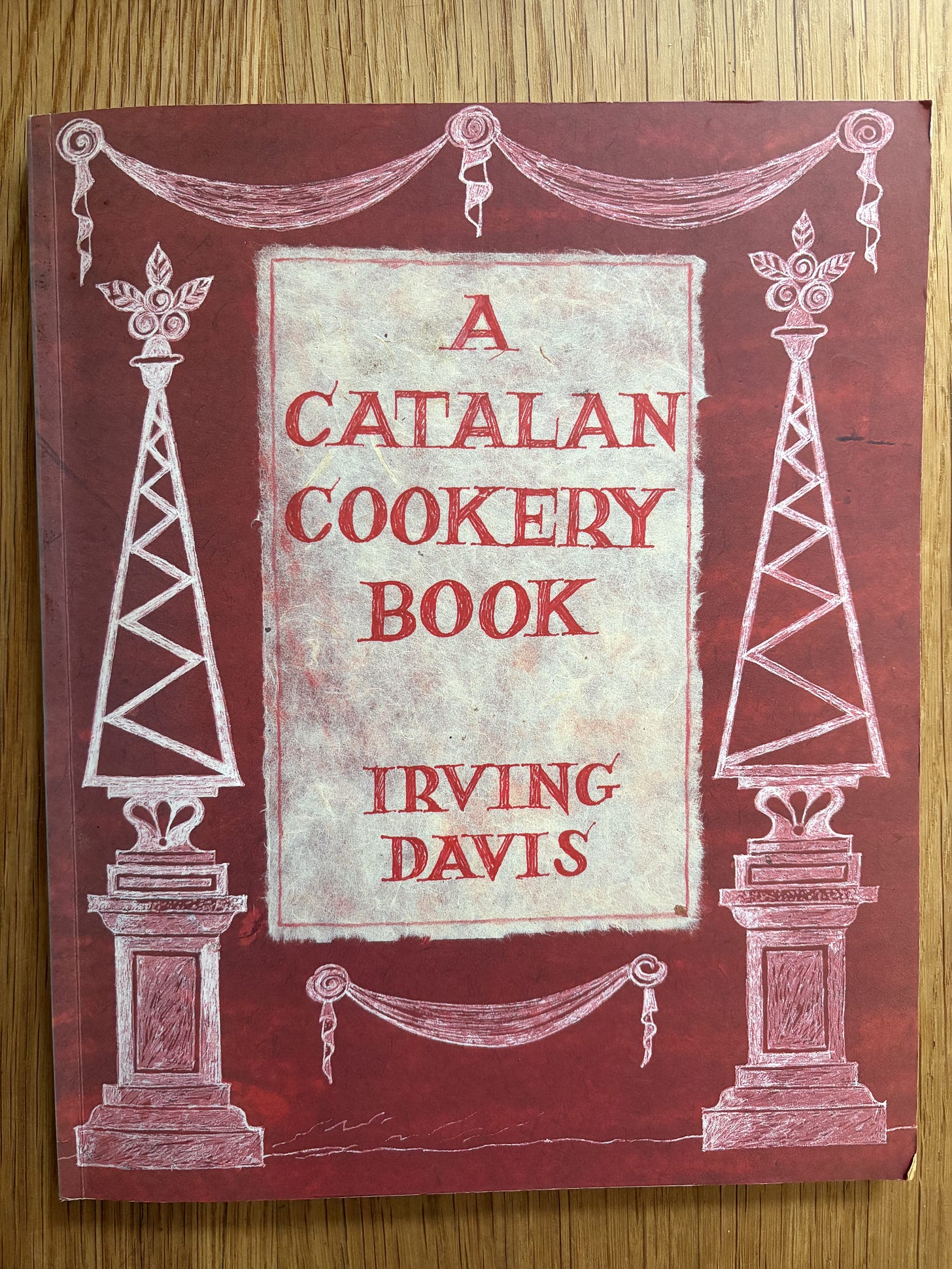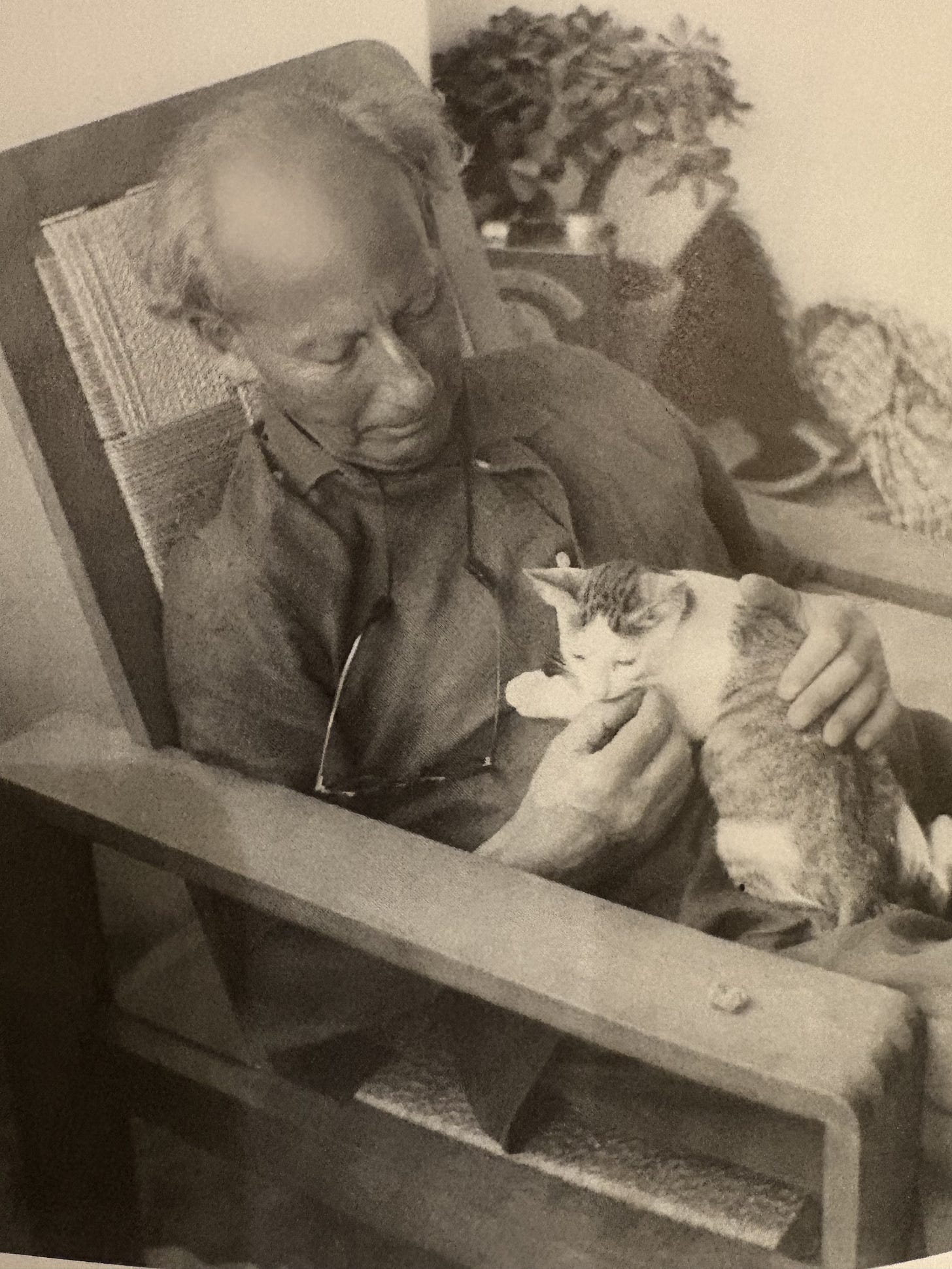You have no idea how elaborate these dishes are but I think it is a good idea to write them down before they are lost or submerged in the international tide. But I hope I shall be able to show the book to you when you come back. It is a huge task & will occupy the rest of my life.
Perhaps anyone who is struggling with the task of producing a cookbook themselves will empathise with this sentiment!
I hope you enjoy reading Jacky Cooks Her Books. All income goes to charity and in 2024 I am supporting Ovacome for their work with ovarian cancer. To receive new posts, read all the recipes and support the charity, consider donating to become a paid subscriber.
Irving Davis wrote this in a letter to Patience Gray in 1963 when he was once again staying at El Vendrell in Catalonia with Apel-les Fenosa, the sculptor and his wife Nicole. The dishes that excited his interest were those prepared by their cook and housekeeper, Anita Simal Llonch, a native of Tarragona.
Nicole Fenosa recalled those summer meals shortly before her death in 2013:
Those summers were radiant and the food and meals preoccupied us enormously.
The subtitle for his book was A Collection of Impossible Recipes. It seemed to him that it would be impossible to recreate them in another part of the world, where produce of the same quality was unavailable and where there was not the traditional patience and skill for the careful chopping and grinding required. After his death in 1967, his handwritten notes, transcribed and edited by Patience Gray, were published privately, with only 165 copies made. It was in 1999 that Prospect Books issued a commercial edition, keeping the engravings by Nicole and adding biographical notes.
Irving Davis had a career that took him across Europe as a dealer in antiquarian books and he was well able to indulge his passion for good food and wine.
Born in 1889 to an upper middle class Jewish family it was after he left Cambridge and was living in Florence that he discovered the joys of cooking and eating well.
The British and American expatriates in Florence in the early twentieth century made an interesting community. Poets, writers, aesthetes and bon viveurs like Harold Acton, Ronald Firbank and Reggie Turner with links to the Bloomsbury set and Oscar Wilde were all part of the literary and artistic scene.
He wrote:
I was not born a homosexual. I can’t remember ever feeling in love with a boy until my Cambridge days and later, my Florence days, when homosexuality was almost compulsory, but that will be another chapter of this my imagined autobiography as will my early sexual experience.
I wrote about Florence in my piece about Janet Ross, her cookbook and career. I wonder if she might have had dealt with his book business?
By 1911 Irving and his partner, Giuseppe (Pino) Orioli, were running an antiquarian bookshop in Florence and then also a branch in Museum Street in London. Orioli had arrived in England in 1907 and was teaching Italian to Cambridge students. It is possible that was where they met and became lovers. By 1931 Irving was sole proprietor of that business which transferred to Maddox Street and ultimately to his home in Hampstead. Orioli had run away with Norman Douglas but continued in the book trade and was the first to publish Lady Chatterley’s Lover in 1928.
I read that it was Orioli who first taught him to cook. Irving had grown up in a family that cared little about the pleasures of the table. He wrote:
In my family, food and still less wine were not considered seriously, although we probably ate better than most Englishmen do today. My father, who by the time I was twelve had developed some mysterious ailment, probably of nervous origin, never varied his diet for the 365 days of the year. At midday he ate a chop with greens, in the evening a steamed sole with rice pudding. My mother, as far as I remember, never went near the kitchen. She could no more have cooked a dish than she would have washed my father’s shirts …..
At Cambridge, having been exempted from dining hall by some wangle which I cannot recollect, I never varied my menu, cold mutton and mint sauce which I ate alternately in my rooms and that of my friend Woolf in Trinity ……
But Orioli like most Italians, was a good cook himself. He had seen his sisters cook and perhaps his father, and when at last we had a ménage of our own, Orioli did not disdain to go into the kitchen and cook the dishes of his native Romagna. Food became an interest for me and cooking, I gradually realised, the sixth art.
By the time of his death in 1967 he was famed as a gastronome, a close friend of André Simon and with him, a founder member of the Wine and Food Society. Patience Gray was a close friend, though 30 years his junior. They had travelled through southern Italy together in the 1950s in the footsteps of Norman Douglas and Orioli. She writes lyrically of her admiration of him in her book, Honey from a Weed. In the chapter, A Homage to a Classic Cook, she describes their travels and meals at his home in London and in Catalonia.
At Irving’s table I learned the full poetic meaning of the word ‘classical’ in which all forethought, selection, trouble, timing - the mechanics of creation - were erased by the disarming simplicity of the outcome, precipitating pleasure and delight.
Here was reflected that diametrically opposite conjunction of liberality and frugality which characterised his way of life, and which, incidentally, is the master-key to the art of cooking.
The man who served rare wines in fine Venetian glass and memorable dinners in Hampstead was the same who gloried in the simplicity of village potato dishes. He was at home in French, Italian, Latin and Greek, would time his trips in search of ancient manuscripts to coincide with the first asparagus in Florence and would barter with book collectors who could offer casks of wine or matured vinegars. He had a passion also for cheap Tuscan cigars and his beloved cats.
It seems probable that the only time Patience Gray and Elizabeth David ever met was at a lunch party given by Irving. Sadly no further details are recorded. As the two women, who wielded such influence with their books in the 1950s, reputedly loathed each other it might have proved a very interesting meal!
I love the story of his dinner party where guests must have been completely bemused when he threw the duck out of the window as it failed to meet his expectation of perfection. Lodged on a drain pipe in high summer it was such a nuisance to the neighbours that the fire brigade were summoned to remove it.
In the world of books his fame rests mostly on his work cataloguing rare volumes. He also did collect and import erotic literature and writes of this himself:
I have read many erotic books and many cookery books and I asked myself why it is so much more amusing to read about the pleasures of the table than those of the bed.
He was married to Ivy Elstob who had been a brilliant Edwardian beauty reputedly much admired by Bertrand Russell. During the general strike of 1926, Ivy, a socialist and champion of the underdog, sold her wedding silver and gave the proceeds to striking miners' families. In the 1930s, she joined the Communist party, and drove to Spain with medical supplies for the International Brigade. A penniless divorcee she found employment in Irving’s bookshop and they married in 1941 after 11 years together. He writes of how she relished the excitement of smuggling banned erotic drawings past customs officers wrapped around her body under her clothing. She died during the war but Irving was supported by his stepdaughter, Ianthe, in his later life. It was Ianthe who in 1957, with Sheila Jones, formed the National Committee for the Abolition of Nuclear Tests, which evolved into the Campaign for Nuclear Disarmament.
Irving Davis died aged 78.
To read on and get the the recipe below as well as access to the many other stories of interesting characters who have written cook books, why not donate to the charity?





